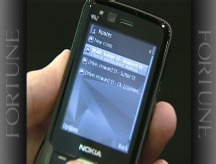Netflix stars in a slow-mo economy
Recession puts the spotlight on the video rental sector.

NEW YORK (Fortune) -- When economic ill-winds start to blow, consumer businesses like booze and cigarettes have turned out to be safe harbors for investors. Will video rental king Netflix prove the same?
With the average U.S. gas price at $4.09 a gallon and movie tickets at $10, it may be.
"I don't know if Netflix (NFLX) is recession proof, but it's certainly an advantage, in the respect that Netflix is almost a substitute for going to the movies," says Needham analyst Charlie Wolf.
Netflix signed up a record 764,000 subscribers in the first quarter, helping to push sales up 7% to $326.2 million over a year ago. First quarter earnings were $13.4 million or 21 cents a share, up from $10 million or 14 cents last year.
The company, however, has trimmed its yearly profit outlook slightly and attributed its strong subscriber growth to a price hike at rival Blockbuster.
That suggests the growth rate is unsustainable. Nevertheless Netflix shares, at $27.20, are up 40% in the past year. At a price-earnings ratio of 17.6 times estimated profits for the coming year, the stock is no longer priced for the discount bin. Blockbuster's stock is down 42% during the same period.
While cautious about Netflix's stock price, Wolf is encouraged about the company's prospects. He upgraded the big DVD renter to hold from sell Tuesday after studying subscriber trends. He found that new customers cancel service at nearly twice the rate of long-term customers. But long term customers keep getting more profitable the longer they stick around.
"Because a subscriber pays a fixed monthly fee [typically $14], the fewer DVDs he rents, the more profitable he is to Netflix. And the number of DVDs a subscriber rents tends to decline with the length of his subscription," Wolf wrote in his report Tuesday.
Perhaps less encouraging is Netflix's attempt to stimulate online downloads by offering customers a $100 set-top device made by Roku. The service requires a fixed-fee monthly plan that tops out at around $40, and the selection is limited to 10,000 non-HD videos and TV shows. Alternatively, Apple (AAPL, Fortune 500) has about 1,000 movies with 100 in high definition available through its set top box.
Assuming entertainment hungry consumers will hunker down with videos to ride out the slowdown, Netflix isn't the only player serving the home-bound. In addition to DVRs, new services are aimed directly at Netflix's rental business like Apple's iTunes movie store. And archrival Blockbuster (BBI, Fortune 500) has revamped its Total Access plan, which adds mail delivery to its in-store service.
A comScore report showed Blockbuster's unique user traffic jump in March and April, "providing an additional reason for caution in evaluating the competitive environment," Thomas Weisel analyst Lloyd Walmsley wrote in a recent research note.
Netflix might be in a good spot to weather the recession, but it has to share the space. ![]()
-
 The retail giant tops the Fortune 500 for the second year in a row. Who else made the list? More
The retail giant tops the Fortune 500 for the second year in a row. Who else made the list? More -
 This group of companies is all about social networking to connect with their customers. More
This group of companies is all about social networking to connect with their customers. More -
 The fight over the cholesterol medication is keeping a generic version from hitting the market. More
The fight over the cholesterol medication is keeping a generic version from hitting the market. More -
 Bin Laden may be dead, but the terrorist group he led doesn't need his money. More
Bin Laden may be dead, but the terrorist group he led doesn't need his money. More -
 U.S. real estate might be a mess, but in other parts of the world, home prices are jumping. More
U.S. real estate might be a mess, but in other parts of the world, home prices are jumping. More -
 Libya's output is a fraction of global production, but it's crucial to the nation's economy. More
Libya's output is a fraction of global production, but it's crucial to the nation's economy. More -
 Once rates start to rise, things could get ugly fast for our neighbors to the north. More
Once rates start to rise, things could get ugly fast for our neighbors to the north. More








